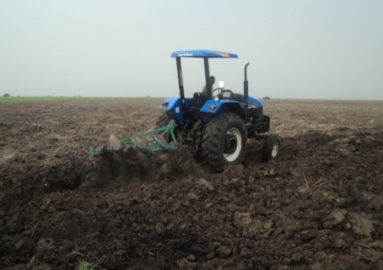Jonglei farmers’ hopes for good harvest lowered
By Philip Thon Aleu
July 2, 2011 (BOR) – Delayed rains and late ploughing of thousands of metres of farm land in Twic East County in Jonglei state are diminishing expectations for a good harvest despite increasing local government support to agricultural activities this year.

“Because of the late rain, there is moisture deficit and the farmers could not plant,” said Mayen Ngor Atem, Jonglei state minister of agriculture and forestry who led the visit to the farms located in Mar, Wangulei and Panyagor in Twic East county.
With tractors ploughing fields and land being sowed by local communities in organised farming groups, there were hopes that increased food production this year would help address food insecurity in the state.
POST WAR, INSECURITY CHALLENGES
Jonglei state’s ministry of agriculture and forestry has stepped up efforts to assist groups of farmers this year by leasing tractors and offering farmers the option of paying in installments to buy state owned machines.
About 35 tractors – including privately owned machines – now operate in the state according to the ministry. With South Sudan due to celebrate her independence from the North in less than a weeks time on 9 July, increasing food production is an essential project. But local communities’ attitudes toward farming are detrimental, Twic East county commissioner Dau Akooi Jurkuch explained.
“We make a lot of encouragement to local communities to produce their own food,” said commissioner Dau.
“We need to proceed with this policy of agriculture to produce our own food rather than bringing the food from Uganda, Kenya. We are able, our land is fertile,” he added.
Moving through villages before reaching Panyagor, the headquarters of Twic East county, the side of farms around huts is very small. Asked to comment on the diminishing farm sizes, the commissioner blames displacement during the war, post war resettlement and lack of human labour.
“You know, people just return homes and they are very reluctant to accept farming,” commissioner Dau said.
But efforts to “abandon relying on relief food” are continuing, commissioner Dau claims.
For local farmers in Twic East, the post-war displacement factor and the late rains played a role in delaying farming activities although insecurity and crime are also to blame.
Atem Ayaach, an administrator in Maar Payam (district) says he had encountered cattle raiders several times since farming began this year.
“We met them [armed raiders] four times here since the work started,” said Ayaach at Yen Thumb, one of the farms located four kilometers east of Maar Payam, Twic East county.
“I am not sure there will be good harvest this [year] given these delayed rains,” Ayaach said when asked what his expectations now measure.
Fuel shortages also delayed some tractors to plough land timely, drivers said.
Though late rains have affected planting in Twic East, in Bor county districts of Baidit and Jalle, green farms could be seen and healthy crops growing despite there being no organised or mechanised farming. The government only supports grouped farmers.
But the hopes are still high on the government side.
“This is the scaling up to increase food production in Jonglei state and South Sudan as a whole,” said Mayen Ngor, the minister of agriculture and forestry in Jonglei state.
The minister expressed his gratitude for business groups that “open the land, cultivate and increased food production so that South Sudan become self-sufficient at this time we are proclaiming a new nation.”
The roads connecting Twic East to Bor, the capital of Jonglei state, are also challenging. Transporting fuel is already a challenge.
When it rains, villages here are flooded as on Wednesday before visiting area, homes around Panyagor stood in pools of water.
(ST)
